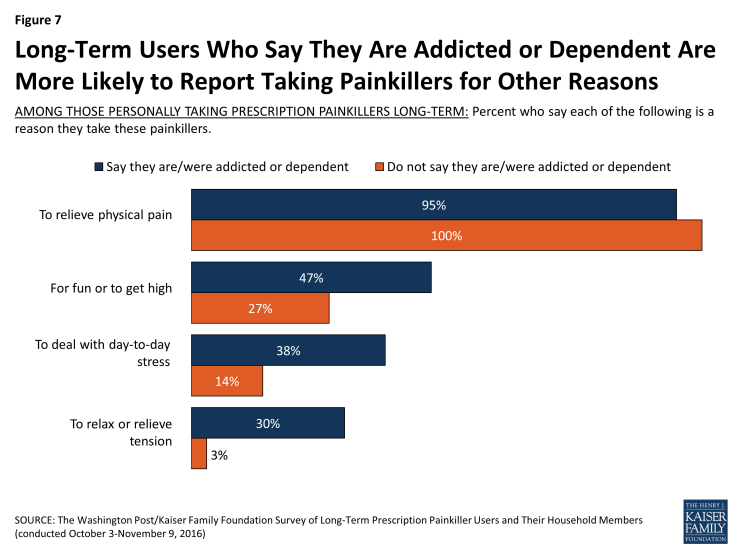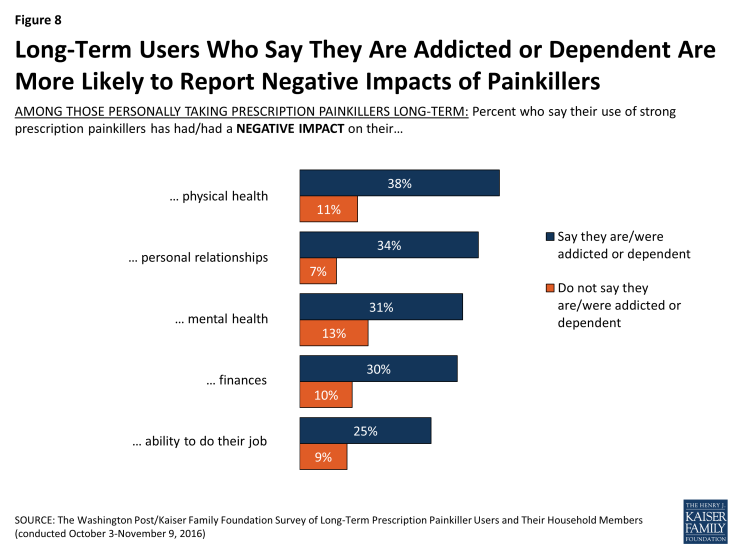The Washington Post/Kaiser Family Foundation Survey of Long-Term Prescription Painkiller Users and Their Household Members
Section 2: A Focus on Those Reporting They Are Physically Dependent or Addicted
Of those personally using prescription painkillers, about a third (34 percent) say they think they are or were addicted or physically dependent on them,1 which accounts for about 2 percent of adults in the U.S. This section examines their views and experiences more closely. Like long-term prescription painkiller users generally, many who say they are or were addicted or dependent say they started for chronic pain (47 percent), a quarter (25 percent) say they started for pain after a surgery, and 19 percent say they started after an injury or accident. Six percent say they started using recreationally.
Nearly all (95 percent) of those saying they’re addicted or dependent say that relieving physical pain is a reason they’re taking the drugs. However, they are much more likely than others to say they’re taking them for other reasons as well, such as for fun or to get high (47 percent versus 27 percent), to deal with day-to-day stress (38 percent versus 14 percent), or to relax or relieve tension (30 percent versus 3 percent).

Figure 7: Long-Term Users Who Say They Are Addicted or Dependent Are More Likely to Report Taking Painkillers for Other Reasons
Not surprisingly, those who say they are or were dependent or addicted also are more likely than others to report being concerned about addiction (49 percent versus 25 percent) and to report misuse, such as taking painkillers not prescribed to them (30 percent versus 10 percent) or giving them to a family member or friend (21 percent versus 11 percent). They are also more likely than others to say they know or suspect someone has taken their pills (28 percent versus 15 percent) and to report that a family or friend has suggested they stop taking the medication (40 percent versus 18 percent).
About a quarter (24 percent) of those who report being addicted or dependent say they think their quality of life is worse after taking these medications, compared to 12 percent of those who do not say they are addicted or dependent. They’re also more likely than those not reporting addiction or dependence to say it’s had a negative impact on their finances, their personal relationships, their employment, their physical health, and their mental health.

Figure 8: Long-Term Users Who Say They Are Addicted or Dependent Are More Likely to Report Negative Impacts of Painkillers
Among those who say they are or were addicted or dependent, three in ten (31 percent) feel their doctor did not provide enough information about the risk of addiction and other side effects, but they are similar to others in terms of reporting that their doctor talked to them about the possibility of addiction or dependence or a plan to get off medications. They’re more likely than others to say they have had trouble with at least one of the following: getting a prescription written or filled, affording the drugs, or getting insurance to pay for them (58 percent versus 33 percent). Eight percent say they have a prescription for Narcan or Naloxone at home, a drug that can reverse the effects of prescription painkillers and prevent overdose.
Controlling for factors such as income and region, younger adults (18-39), Hispanics, and those who report taking the painkillers for two or more years are more likely than their counterparts to report being addicted or dependent on the drugs.
